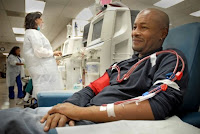Many kidney failure patients want more detailed information about their treatment choices, according to a new study.
More than 30 percent of the 1,000 U.S. patients who took part in an Internet survey said they felt that the different therapies -- in-center hemodialysis, peritoneal dialysis, home hemodialysis and kidney transplantation -- were not "equally or fairly presented to them."
Nearly 70 percent of the respondents told the researchers that they were not provided with specific education and training about home hemodialysis, a relatively new option that may offer some advantages -- including ease of treatment -- over in-center dialysis.
Overall, the participants were moderately to highly satisfied with their current treatment, but satisfaction was highest among transplant patients and home dialysis patients, and lowest among in-center dialysis patients.
Doctors had the most influence over people's choice of therapies, the survey found. And, what patients said they wanted most was more information on new treatment and improved medications.
The study was published online Feb. 17 in the Clinical Journal of the American Society of Nephrology.
"Dialysis patients should be provided with enough information to choose optimal therapies," Dr. Stephen Fadem, of Baylor College of Medicine in Houston, and lead author of the report, said in a news release from the American Society of Nephrology. "Our survey shows that dialysis patients do not always receive uniform, thorough information about all possible treatment methods and, as a result, are only moderately satisfied with their pre-treatment education."
~BusinessWeek.com~
Friday, February 18, 2011
Wednesday, February 16, 2011
Patients need wake-up call about link between kidney disease, diabetes
A multicultural study that will appear in the March issue of the Journal of Renal Care underscored the relationship between kidney disease and diabetes, and the need for greater awareness of this link.
In this small study, 23 South Asian diabetes patients and 25 white diabetes patients between the ages of 34 years and 79 years — with an average age of just older than 70 years — were surveyed to note any differences in the experiences, knowledge and attitudes of the two groups.
The researchers, led by Gurch Randhawa, director of the Institute for Health Research at the University of Bedfordshire, and research fellow Emma Wilkinson, found that many of the patients studied were unaware of possible kidney problems before their referral to specialist services. Overall, patients felt that they had received limited information about possible complications when they were diagnosed with diabetes, the researchers noted.
"Our research shows that low awareness and lack of information about kidney problems are common in both the South Asian and white patients we spoke to," Randhawa said. "In some cases, this was exacerbated by language barriers. The findings also demonstrate that the long-term educational needs of patients who have had diabetes for many years are just as important as the need to make newly diagnosed patients aware of all the health risks they face."
~ Drug Store News ~
In this small study, 23 South Asian diabetes patients and 25 white diabetes patients between the ages of 34 years and 79 years — with an average age of just older than 70 years — were surveyed to note any differences in the experiences, knowledge and attitudes of the two groups.
The researchers, led by Gurch Randhawa, director of the Institute for Health Research at the University of Bedfordshire, and research fellow Emma Wilkinson, found that many of the patients studied were unaware of possible kidney problems before their referral to specialist services. Overall, patients felt that they had received limited information about possible complications when they were diagnosed with diabetes, the researchers noted.
"Our research shows that low awareness and lack of information about kidney problems are common in both the South Asian and white patients we spoke to," Randhawa said. "In some cases, this was exacerbated by language barriers. The findings also demonstrate that the long-term educational needs of patients who have had diabetes for many years are just as important as the need to make newly diagnosed patients aware of all the health risks they face."
~ Drug Store News ~
Subscribe to:
Comments (Atom)





